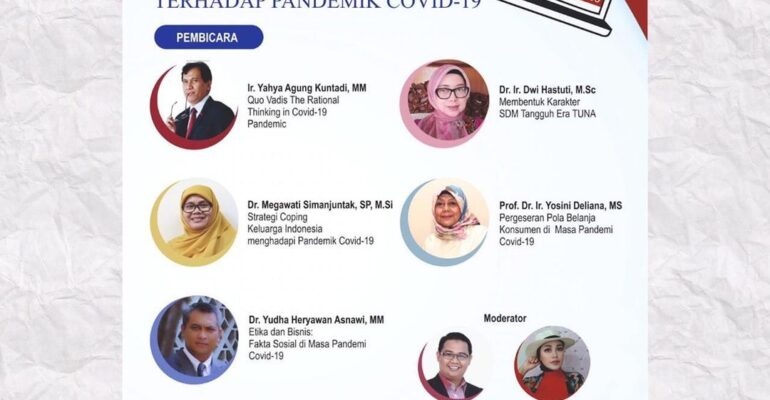Business Talks Series # 7: Coping Behavior of Individuals and Families Against the COVID 19 Pandemic

Business Talks Series # 7: Coping Behavior of Individuals and Families Against the COVID 19 Pandemic
Bogor, 29 June 2020 – IPB University Business School (SB-IPB) again held a Business Talk Series (BTS) seventh edition on Monday (29/6). SB-IPB in collaboration with the Faculty of Human Ecology IPB University (FEMA IPB) has the opportunity to host the fifth Webinar Series held by the Asian Association for Consumer Interest and Marketing (AACIM) in collaboration with the London School of Public Relations (LSPR), Universitas Airlangga (UNAIR) , Institut Teknologi Sepuluh Nopember (ITS), STIE Perbanas, and BPKN. This webinar raises the topic “Coping Behavior of Individuals and Families Against the Covid-19 Pandemic”.
Five speakers were invited to this webinar, namely (1) Ir. Yahya Agung Kuntadi, MM explained about Quo Vadis The Rational Thinking in Covid19 Pandemic (2) Dr. Ir. Dwi Hastuti, M.Sc talked about shaping the character of human resources in the TUNA era (3) Dr. Megawati Simanjuntak,
SP, M.Si raised the topic of Indonesian Family Coping Strategies Facing the Covid-19 Pandemic (4) Prof. Dr. Ir. Yosini Deliana, MS explained about the Shifting Patterns of Consumer Spending during the Covid-19 Pandemic; and (5) Dr. Yudha Heryawan Asnawi, MM, who closed the webinar session with a discussion regarding Social Facts during the Covid-19 Pandemic from an ethical and business perspective.
The webinar was opened by the presenter of the SB IPB undergraduate students, namely Neldo and Maria Jacklyn at 08.30 WIB. The event started by presenting the profile video of the Business School, FEMA, and AACIM and then continued by singing the song Indonesia Raya. After that, the speech by Prof. Dr. Noer Azam Achsani, MS as Dean of SB IPB and Prof. Dr. Ir. Ujang Sumarwan, M.Sc as President of AACIM. Afterwards, the webinar was taken over by Moderators, namely Hanif and Fitry Primadona. One by one the speakers were given the opportunity for ten minutes to explain their respective material, then continued with a discussion session filled with several questions from the participants in each session.
Ir. Yahya Agung Kuntadi, MM said that the flow of thoughts possessed by humans can be classified into two types, namely rational and emotional. Rational thinking relies on logic in responding to phenomena that are analyzed with a certain process and in order while emotional thinking rests on feelings that are analyzed quickly and there are no standard rules. Rational thinking is needed by humans to make decisions in the midst of uncertain conditions such as in the current conditions during the Covid-19 pandemic.
Furthermore, Dr. Ir. Dwi Hastuti focuses on the psychological impact experienced by the family which was also produced by the Covid-19 pandemic. “The solution to facing the new era is how to make the environment free from stress and try to manage it, stimulate the brain with happy hormones, relax with light motor activity, and also eat good food. Furthermore, it is also important to build positive emotions and create sources of happiness in the family because emotions are the energy of communicating, spreading positive energy around family and community life. ” He said.
Megawati Simanjuntak SP, M.Si said that the family is the smallest unit affected by Covid-19, especially from the economic condition or the income side. The changes that have occurred have caused many workers to be laid off or layoffs. “Based on data from the SEMRU Research Institute, there has been an increase in the percentage of poor families in Indonesia due to the Covid-19 pandemic from 8.2% to 15.4%. Apart from that, family feelings also show a worse result. Therefore, every family must implement a coping strategy by limiting expenses and increasing the flow of income, “he said.
Prof. Dr. Ir. Yosini Deliana, MS said that the shift in spending patterns was caused by a disrupted economy due to layoffs. “The spending patterns of various types of consumers during this pandemic can be seen from the aspects of income, products purchased, ways of shopping, and focus of goods purchased. Between generations also have their own preferences. However, there are things that do not change in the new era, for example there must be experiential value, the desire to get a fair price, and consider the advantages and disadvantages. ” He explained.
Meanwhile, Dr. Yudha Heryawan Asnawi said that the expanding virtual market has resulted in a market deconstruction that has shifted from voluntary exchange to ambiguity exchange, thus creating a coercive market or “forced market” and power reinforcement that suppresses consumer resilience. Therefore, we need rules or institutions that maintain morals and ethics in business that fulfill three things, namely supporting human existence, social systems, and space of live. The webinar ended at 11.30 with a closing statement from Prof. Ujang Sumarwan as president of AACIM. (Faa / FK)


